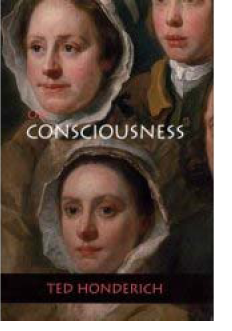Ted Honderich is one of the world’s leading contemporary philosophers of consciousness. Here, he defines and explains the idea.

[There are] three parts, sides or elements to consciousness. Perceptual consciousness is seeing and the like. Reflective Consciousness is thinking and the like. Affective consciousness is desiring, feeling and the like …
[F]or you to be perceptually conscious is for a world or a totality of things to exist. [A] person’s perceptual consciousness is … a subjective world. That is, it is precisely not the physical world, despite its being real in the sense of being spatio-temporal and having propertied things in it … Being perceptually conscious … is for … a [physical] world to exist.
[R]eflective consciousness [includes]:
-
… reflective things implicit in perceptual consciousness includ[ing] conceptualizing … and also attending, studied a good deal in psychology.
-
… memory—both the activity of remembering and the result of that activity.
-
… curiosity and inquiry. We ask questions, try to measure, seek causes and effects, experiment, guess, reason, seek to prove, and do philosophy, science, morals and politics.
-
… we suppose, judge and believe things to be the case …
-
We imagine things, make up stories, create art.
-
In sleep, we dream.
[A]ffective consciousness [is] desiring or feeling in a general sense …
-
… desires and wants of very many kinds, and … satisfactions and frustrations … ranging from inclinations and hankerings, through wants and appetites, to cravings and lusts, to irresistible compulsions … separable in general into attractions and repulsions.
-
… a wide range of sensations, feelings, emotions [and] attitudes … includ[ing] pain, pleasure, hunger, satiety, hope, fear, courage, pride, shame, happiness, anger, sadness, love, loyalty, respect, wonder, depression, calm and so on.
-
… valuing. Almost all things have some value for us. They are good or bad for me or you from the point of view of self-interest. They are right or wrong morally. They are legal or not, rational or not, beautiful, expensive, preferable, tolerable and so on …
-
… intentions of two sorts, forward looking … such as the intention to travel by train tomorrow, and the active kind of intentions, these being involved in the actual initiation and carrying forward of actions.
Honderich, Ted. 2004. On Consciousness. Edinburgh: Edinburgh University Press. pp. 183, 184, 155–157, 187–188, 198. || Amazon || WorldCat
